EATNG SEASONALLY – WHY IT’S IMPORTANT FOR YOUR HEALTH
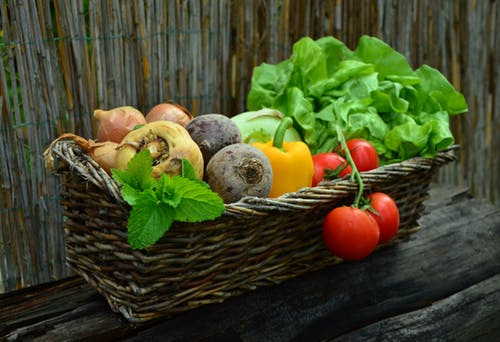
In today’s society most of us have forgotten what it means to eat seasonally, what does it mean anyway …! and most importantly most of us have probably forgotten which fresh fruits and vegetables are in season!
Do you know what’s in season this month??!!!
We’re so used to looking up a recipe, writing down the list of ingredients, hopping into the car and driving to the nearest supermarket and buying what’s needed.
That’s all well and good occasionally but did you actually stop to think, if … “… these fresh ingredients are REALLY FRESH and in season?”
It’s the dead of winter, below zero and it’s blowing a gale outside and I feel like having a piece of strawberry shortcake, or a piece of mango cheesecake. Yes, I’m sure you’d love to have a piece too and have done something similar.
Yet, how many of us stop to think, when all our thoughts are on that piece of strawberry shortcake, that strawberries and mangoes are out of season! I bet not many of us, because in today’s society everything is available all year round, right?!
SO WHAT’S WRONG WITH EATING OUT OF SEASON?
To start with, the main reason about eating foods that are out of season means that their nutritional value is not at its highest and nor is its taste and it usually more expensive.
I’ve never really thought about all of this before my intestinal problems but it’s true.
A strawberry bought in spring within its seasonal period has the richest, sweetest and deepest flavour than if bought during the winter months. Having been forced to grow in a hot house somewhere.
Tomatoes too, have absolutely no flavour in winter compared to when they are bought in their seasonal peak, during summer.
I’d like to help you get accustomed to eating foods that are in season, at least most of the time.
This means that you will not only have richer tasting foods, but they will be jam packed with their prime nutrient content as well as being cheaper on the pocket.
I think that being thrifty and being aware puts a smile on anyone’s face. Don’t you agree?
Mother nature has provided us with different fruit, vegetables and herbs to help us combat with the effects of the different seasons we need to face.
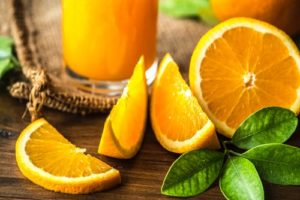
Have you ever given any thought as to why oranges are a winter fruit, full of vitamin C. They’re at their best in winter to help us combat against colds and flu’s. The winter vegetables are perfect for hot meals, soups and stews.
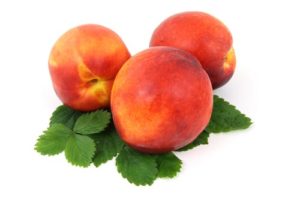
In summer we need to keep cool and well hydrated. No wonder mother nature provides us with cucumbers, watermelons that are full of water and the stone fruits which are in season are high in beta-carotenes to protect us against the sun’s rays.
Spring is renowned for renewal and re-birthing season and we usually need to cleanse and detox our bodies after the long winter months where our diets were probably full of fatty foods to keep us warm. Spring provides us with asparagus and artichokes which are great for detoxing and losing extra fat stored during winter from heavier foods.
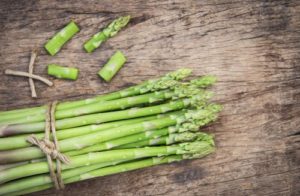
Another important point to remember is that seasonal fruit and vegetables can be purchased from your local farm which means zero kilometers and guaranteed freshness.
Out of season foods are usually shipped in and/or harvested early to ensure they arrive in good condition during their shipment and distribution. So, by the time the food reaches your table it’s lost a lot of it’s nutrients and taste.
Eating seasonally makes you more aware of what you’re cooking and feeding your body, which in turn is better for your overall health. You are consciously making better choices for you and your family’s health and well being.
Eating seasonally makes you challenge your creativity, coming up with new delicious recipes based on what you have on hand rather than cooking the same foods year in and year out. It will also get you to try new foods. For example, how many of you actually buy fresh artichokes and know who to prepare them and cook them?
Growing up in a European environment in Australia meant that artichokes were a part of my diet as a child but it wasn’t until I actually got married and had to prepare them myself that I learnt how to do it. So you’re not alone!
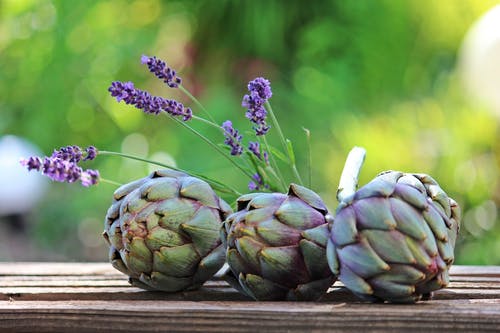
Artichoke leaves prepared as a herbal tea can help detoxing after the winter months
Basically eating seasonally ensures we are getting maximum nutrients from our fresh produce and it makes us more aware of nature and the role it plays on the health and well being of our bodies.
In summary, each season offers an abundance of fresh produce and the advantages of eating seasonally are:
- The fresh produce tastes better, fresher and sweeter. Out of season crops are harvested early and refrigerated so that they will keep during transportation and this reduces their flavour; then they need to be artificially ripened at destinations. No wonder we often find floury apples and tasteless fruit and vegetables.
- Nutritionally higher value as it is consumed closer to harvesting. Many nutrients decline rapidly when stored for long periods.
- It’s cheaper, so you can also buy in bulk and preserve, freeze or pickle the produce for the up coming months. That’s why Italians have always harvested and made their tomato sauces during summer to enjoy the summer vegetable during the winter months. We need to learn from our ancestors, and listen to what our grandmothers did.
- Eating seasonally also helps you support your local producer and the local farmers
- Which in turn means zero transport, refrigeration so we are more environmentally friendly.
Obviously, there may be times when you want to eat something that is out of season and you want to make that strawberry shortcake in the dead of winter for your dinner party friends or depending on where you live, local produce is not nearby, but at least you can become more aware of its importance. This means making a positive decision and conscious effort towards improving your health and saving a few dollars each time we do our grocery shopping.
So let’s take a look at what’s in season.
MAY PRODUCE
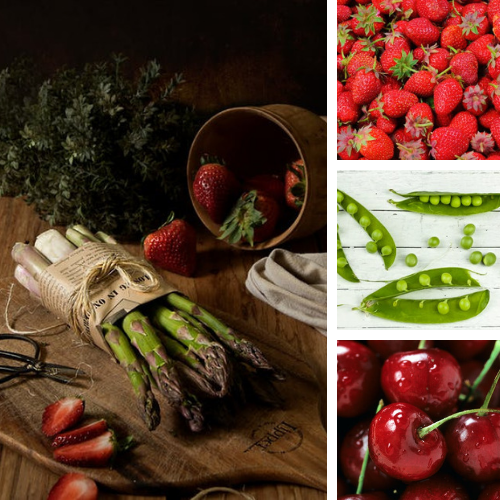
As Spring is settled in May we continue to see artichokes and asparagus, spring peas, chard, cabbage, chicory, string beans and fava beans, radishes, endives, beets, turnips, spinach, radish, celery, fennel, lettuce, and the first zucchini. As far as fruits are concerned we have cherries, strawberries, kiwi, melon, rhubarb,
If your looking for recipe ideas – just click on the linked produce.
